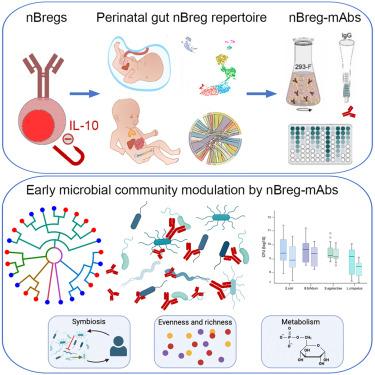当前位置:
X-MOL 学术
›
Cell Host Microbe
›
论文详情
Our official English website, www.x-mol.net, welcomes your
feedback! (Note: you will need to create a separate account there.)
Intestinal newborn regulatory B cell antibodies modulate microbiota communities
Cell Host & Microbe ( IF 20.6 ) Pub Date : 2024-09-06 , DOI: 10.1016/j.chom.2024.08.010 Qisheng Gu 1 , Marion Draheim 2 , Cyril Planchais 3 , Zihan He 2 , Fan Mu 2 , Shijie Gong 2 , Chun Shen 4 , Haitao Zhu 5 , Dania Zhivaki 6 , Khashayar Shahin 7 , Jean-Marc Collard 8 , Min Su 9 , Xiaoming Zhang 10 , Hugo Mouquet 3 , Richard Lo-Man 1
Cell Host & Microbe ( IF 20.6 ) Pub Date : 2024-09-06 , DOI: 10.1016/j.chom.2024.08.010 Qisheng Gu 1 , Marion Draheim 2 , Cyril Planchais 3 , Zihan He 2 , Fan Mu 2 , Shijie Gong 2 , Chun Shen 4 , Haitao Zhu 5 , Dania Zhivaki 6 , Khashayar Shahin 7 , Jean-Marc Collard 8 , Min Su 9 , Xiaoming Zhang 10 , Hugo Mouquet 3 , Richard Lo-Man 1
Affiliation

|
The role of immunoglobulins produced by IL-10-producing regulatory B cells remains unknown. We found that a particular newborn regulatory B cell population (nBreg) negatively regulates the production of immunoglobulin M (IgM) via IL-10 in an autocrine manner, limiting the intensity of the polyreactive antibody response following innate activation. Based on nBreg scRNA-seq signature, we identify these cells and their repertoire in fetal and neonatal intestinal tissues. By characterizing 205 monoclonal antibodies cloned from intestinal nBreg, we show that newborn germline-encoded antibodies display reactivity against bacteria representing six different phyla of the early microbiota. nBreg-derived antibodies can influence the diversity and the cooperation between members of early microbial communities, at least in part by modulating energy metabolism. These results collectively suggest that nBreg populations help facilitate early-life microbiome establishment and shed light on the paradoxical activities of regulatory B cells in early life.
中文翻译:

肠道新生儿调节性 B 细胞抗体调节微生物群落
产生 IL-10 的调节性 B 细胞产生的免疫球蛋白的作用仍然未知。我们发现,特定的新生儿调节性 B 细胞群 (nBreg) 以自分泌方式通过 IL-10 负向调节免疫球蛋白 M (IgM) 的产生,限制了先天激活后多反应性抗体反应的强度。基于 nBreg scRNA-seq 特征,我们在胎儿和新生儿肠道组织中鉴定这些细胞及其库。通过表征从肠道 nBreg 克隆的 205 种单克隆抗体,我们表明新生种系编码的抗体对代表早期微生物群六个不同门的细菌表现出反应性。nBreg 衍生的抗体可以影响早期微生物群落成员之间的多样性和合作,至少部分是通过调节能量代谢。这些结果共同表明,nBreg 群体有助于促进早期微生物组的建立,并阐明早期调节性 B 细胞的反常活动。
更新日期:2024-09-06
中文翻译:

肠道新生儿调节性 B 细胞抗体调节微生物群落
产生 IL-10 的调节性 B 细胞产生的免疫球蛋白的作用仍然未知。我们发现,特定的新生儿调节性 B 细胞群 (nBreg) 以自分泌方式通过 IL-10 负向调节免疫球蛋白 M (IgM) 的产生,限制了先天激活后多反应性抗体反应的强度。基于 nBreg scRNA-seq 特征,我们在胎儿和新生儿肠道组织中鉴定这些细胞及其库。通过表征从肠道 nBreg 克隆的 205 种单克隆抗体,我们表明新生种系编码的抗体对代表早期微生物群六个不同门的细菌表现出反应性。nBreg 衍生的抗体可以影响早期微生物群落成员之间的多样性和合作,至少部分是通过调节能量代谢。这些结果共同表明,nBreg 群体有助于促进早期微生物组的建立,并阐明早期调节性 B 细胞的反常活动。































 京公网安备 11010802027423号
京公网安备 11010802027423号